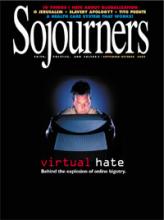A tall, ramrod straight combat arms officer faced the graduating class of the U.S. Military Academy at West Point. "I tell my men every day," he said, "there is nothing worth one of them dying for....Prohibiting casualties is the top-priority mission I have been given by my battalion commander." In other words, if the mission conflicts with force protection, the mission gets scrubbed. Gone is the moral tenet, as stated in Samuel Huntingtons military classic The Soldier and the State, "for the soldier to respond effectively when called upon to defend the defenseless, even to the point of death."
The officer corps of the U.S. Army is in an ethical muddle. In a provocative paper titled "Army Professionalism, the Military, and Officership in the 21st Century," three West Point teachers are challenging the U.S. military and, by inference, NATOs policy of "radical force protection." They believe that this policy is the latest example of the erosion of the soldiers ethos of self-sacrifice and "corroding the professional military ethic." They place the blame in part on changes in international politics since the end of the Cold War, the new nature of conflict, and undue political pressure for "force protection." Apparently the problem is so widespread that West Point has opened a Center for the Professional Military Ethican oversized camouflage couch on which the Army can work through its identity crisis.
Read the Full Article
